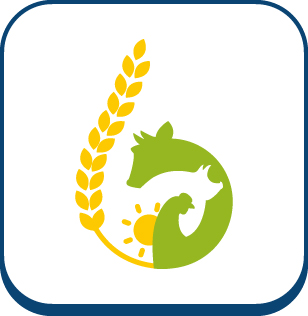Does the restrictively fed growing pigs have a higher digestible lysine requirement relatively to net energy intake than pigs fed ad libitum ?
Ajouter à ma liste
Auteurs :
Quiniou N, Hamelin E, Noblet J
Two trials were carried out on gilts studied in individual pens in order to characterise the effect of feed restriction on digestible lysine (LYSd) requirement relatively to net energy intake (NE) between 35 and 105 kg. In trial 1, pigs were fed 100%, 95%, 90% or 80% of ad libitum energy level on a body weight basis, with same daily amino acids supplies. Decrease of NE intake was associated with a linear decrease (i.e., no plateau) of average daily gain (ADG, -40.6 g/MJ). In trial 2, pigs were allocated to one of the five treatments: ad libitum feeding (AL100), 10% LYSd restriction (AL90), 10% NE restriction associated with 90% (R90), 95% (R95) or 100% (R100) of AL100 LYSd supply; LYSd requirement (or 100 level) was estimated as 17.2 g per kg ADG. Reducing LYSd supply in ad libitum fed pigs resulted in decreased ADG and feed conversion ratio (817 vs. 853 g/d in AL100 and 27.7 vs. 26.4 MJ NE/kg in AL100, respectively). Reducing NE supply decreased ADG but without any difference between treatments R90, R95 and R100 (ADG: 777 g/d, FCR: 26.3 MJ NE/kg, on average). This trial validates the concept according to which an increase of LYSd/NE ratio is not necessary when NE supply decreases in pigs whose relationship between protein deposition rate and NE intake is linear. From a practical view, it means that the same diet can be used for different feeding intensities without any difference on growth performance, except the effect of feed restriction.
Fiche technique
Titre :
Does the restrictively fed growing pigs have a higher digestible lysine requirement relatively to net energy intake than pigs fed ad libitum ?
Date sortie / parution :
2006
Référence :
Journées de la Recherche Porcine (Fra), 2006, Vol.38, p. 149-156
Auteur
Quelques mots clés
Autres documents
Le besoin en lysine digestible relativement à l'énergie nette des porcs rationnés est-il plus élevé que celui des porcs alimentés à volonté ?
Deux essais ont été réalisés sur des femelles élevées en individuel afin de quantifier l'effet du rationnement sur le besoin en lysine digestible (LYSd) par rapport à l'énergie nette (EN)…
Publié en 2006







